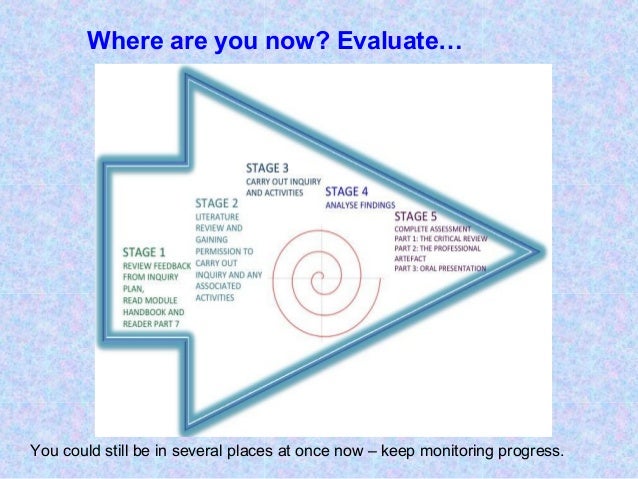I was so pleased to finally be able to join in on a breeze/Skype session with Paula Nottingham and other Module 3 students like myself. It is always such an encouragement to chat to those who are at a similar stage to you and to throw some ideas around to get brains ticking.
We started off by reviewing what stage we are all at and how we are managing our time and resources effectively to make the most out of the short, hectic time we have left on the BAPP course. Once again this diagram proved to be really useful:

(Taken from the slides presented by Paula throughout the session)
Surrounding these stages, Paula reiterated how important it is for us to carry on with blogging, discussing, using our SIG's, reading our Handbooks and just generally getting involved in the whole BAPP community. When we are so close to the finishing line it is important for us not to lose focus and give up. I only know from my own experience of this Module that it can be stressful and challenging as there is so much to think about. I find myself making lists everyday and creating a timetable of what I can fit in and when. This really helps me to keep on top of the work I have to do and also to not forget a important tasks I have to completed.
I guess you could think of it as running a marathon. You train for so long and do all of the preparation (research, literature review, setting up interviews etc) that when it finally comes to physically running, it's quite a daunting task! When faced with a challenge like this, you have to think about pacing yourself and jogging along at a steady, manageable pace. It is important to not hit a wall, freak out and panic yourself into a frenzy where productivity and progress is impossible. Just keep running and you'll get there!

Paula also commented on how there is almost too much information out there and when you look at how much you have accessed and collected it can seem really confusing. It is like a huge painting hung in a gallery that looms over you and challenges you to appreciate all of its intricate visuals. Paula said to focus in on a part of the bigger picture to prevent yourself from feeling overwhelmed and lost amongst your research. I have to admit that I myself am aware of how much information I need to sort through in an attempt to decide what is really relevant and beneficial to my inquiry. So I am happy to have had this reassurance from Paula to prompt me to figure out where I am and where I want to go with my inquiry.
Paula also interestingly commented that it's
"not just about doing, but thinking about doing". This comment has prompted me to evaluate how I am thinking about and presenting my work. It is very easy to just be "doing" things, ticking them off your to-do list and thinking that you are done with them, when actually it is really important to expand your thinking and come up with ways to do things differently. Creative thinking is so important especially due to the nature of the BAPP course and how it encouraged us to be more creative in everything we do.
This ties in nicely with a further discussion we had about our Critical Review. At around 6000 words this should also, along with our Artefact, be an interesting and creative way of us communicating what we have found out through our inquiry. I more naturally express myself through the written word and so it is a challenge for me visual aids when presenting my work. This is something that I really want to introduce more into my thinking in an attempt to be more creative and think about what I am doing rather than just doing it.
Paula also reassured us that when we are first drafting our critical review, do not worry if it appears to be messy and too long. It is part of the process to be able to edit what is there until the final concise piece is complete. This process actually allows you to get all of your ideas and research down in one place before organising it and deciding what is really worth making it to the final cut. She also mentioned about name dropping - putting in names of authors in the body of the text who are supporting your arguments. This shows that you have done your research and can appreciate those who have gone before you and contributed to the exploration of something related to your topic area.
Finally we each individually had a shot at explaining any emerging ideas that we have recently experienced. I brought up about my first interview experience and how I collected plenty of information which I now really need to get my head around. It was fascinating listening to how other students are working through the process and finding new ways to be creative with the ideas they are discovering. I also found common ground with Charnelle as we are both holding interviews at the trade union Equity. We have agreed to have a discussion in the near future about our own research and how we can assist one another in our ideas so that was a really positive development.
Overall it was a pleasure to be involved and I look forward to the next session!



